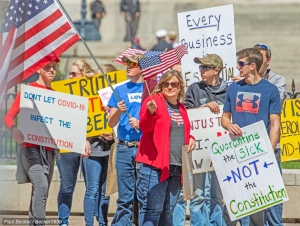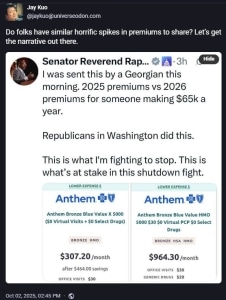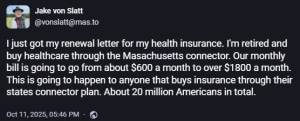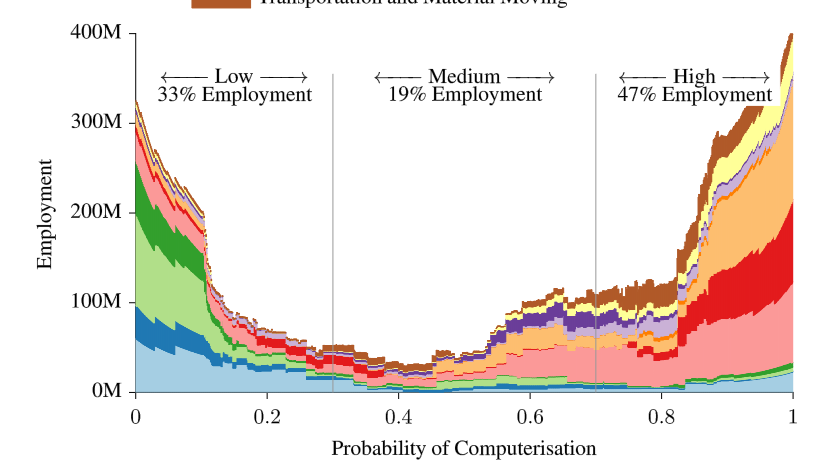
Asian teens dancing memes on disease safety precautions are amazing
Everything is changing, and in the face of that, America is failing. Over 90,000 souls have paid for our failing. Millions more are living in terror for their livelihoods and their families. But Covid-19 isn’t a technology problem, or a science question, or a supply chain issue, or even a question of doctoring. This challenge is public health, and that is something we’ve been failing at for a damn long time. Not completely, but for most people the American health system is a nightmare, and interacting with it is among Americans’ greatest fears. Without addressing that fact, anything else we do can’t succeed, not in the models of countries like South Korea, Germany, or the overlooked best of all pandemic responses, Vietnam. (Not only did they aggressively treat, trace, and quarantine every case, but they did wonderful and meme–worthy public communication from the start)

…Versus pasty uncool white people protesting their right to sicken other people before they die themselves.
California Governor Gavin Newsom, who reacted quicker than any other governor to shut down the state of California, saved innumerable lives. Now he is opening many shops for curbside pick up, and relaxing other measures. “This is a very positive sign,” he said, “and it is happening for only one reason: The data says it can happen.”
But with testing capacity still lacking in the state, (fewer than 1 in 20 Californians being tested) the data says no such thing, and it’s even worse in most of the country. We are not ready to open. The history of fighting epidemics from Ebola to AIDS to antibiotic resistant TB is very clear. To stop an epidemic: catch every case with testing, trace every contact, and make sure the ill and their contacts can and do isolate safely, and be treated promptly if they fall ill. That last part is key, and each of these epidemics have borne out that treatment is important to both preventing transmission, and creating a unified populous for fighting the epidemic. Without all of those elements, the only thing stopping Covid-19 burning through the world is staying home, staying distant from everyone else – the isolated life we’ve been living so far in this pandemic.
Sars-CoV-2 is an infectious respiratory virus with a as-of-yet unknown but presumed small infectious dose. One person missed, one popular guy or woman about town doing essential work can start the whole cycle again within days without ever so much a cough or a headache. One party full of invincible young people or one pre-symptomatic nurse can begin another train of transmission that can eventually sicken or kill thousands.
The decisions that determine the course of an epidemic, all epidemics, are personal decisions. They happen millions of times every day in all kinds of contexts around the world. They happen when a kid stays in, or sneaks out a window. They happen when a community of faith cannot bear to be apart and tries to find ways to cope. They happen when people are balancing the need for health and comfort against the proclamations of some local official who is now a soi-disant disease expert. They happen when a doctor with unexamined bigotry passes over caring for a black patient in favor of a white one, or a rich man over a poor woman. They walk the balancing line between top-down power, community consciousness, and the choices each person makes about who they care about and how they enact that caring. On this score, in this pandemic, America has one terrible failing that rises above all of its others: its unwillingness to provide treatment to the sick.

This nonsense.
There are a lot of bad and desperate ideas in America right now: immunity get-out-of-jail-free cards, Bluetooth contact tracing apps, incoherent partial re-openings, and going wild and pretending it’s all going to go away if we just can get a haircut.
The idea of certifying immunity status would be terrible. If you wanted something like that to work, it would have to convey no immediate benefit to the person being certified immune, and certainly not convey the benefit of being free and able to earn a living for yourself and your family. It is the ultimate moral hazard arising out of an immoral and unjust system.
How would you punish people for defrauding this system? Incarceration and fines would only drive more disease. And people faking immunity is the best case problem a health system would face. The worst is people intentionally getting the disease in order to be allowed back into society, and spreading the virus, even knowingly, because they are desperate. What will you do to the people using this system to get ahead in life? Covid-19 parties are inevitable, because people are people, but what happens when they become a condition for public life? Not only will it drive the poor to risk death while the rich sit away safer in their homes, it means that the level of disease will persist in semi-permanently trapping everyone who doesn’t want Covid-19 and can afford to never go out.
Bluetooth apps do not contract trace. Tracing is an intimate process, a long empathetic conversation with a person who understands your community and seeks to understand and hear you. You have to trust a contact tracer, you have to feel like the people who you name and place in their system will be cared for, protected, and treated, should the worst come to pass.
Bluetooth can’t tell if there’s a wall between you. It can’t tell how windy it was between you and that other person, or if you were stuck in traffic next to them for a half hour. An app can’t tell that you left your phone at home that one time. It cannot tell you of someone who went to the emergency room suddenly, phone lost and forgotten, only to be admitted for a week. It cannot tell you about someone who died alone at home, without ever being tested at all. It can tell you about neighbors you never see or speak to, but it can’t tell you it’s them, so you sit, wondering who it was, wondering if it was real, and what to do now.
Tracing a disease through a community is a human conversation. These are things only humans can do. This is a human job, and a job for those who are trusted by their communities, that speak the language, that know about the things that happen in the neighborhood.
Contact tracers don’t just question people. They mostly are there to listen, and to listen carefully, to safeguard people’s secrets and hopes as well as their shame and their double lives. They need to not just speak the language of those affected by the disease, they need to speak the culture. In the largely Spanish-speaking immigrant neighborhood where I am sheltering-in-place, I take many walks. And in those walks, I have seen hundreds of informational flyers, but almost none in Spanish – more failing.
We know that we need more testing and contact tracing, and we know we need people to quarantine to slow this disease, but before all that, we need to treat the people who are most at risk as human beings. In the long term, everyone’s fate depends on that.
If you want people to stay home and be safe, it has to be financially and logistically possible. People who are doing the right thing have to be supported and cared for. If you want people to seek medical care, it must be available and not cost more than the patient can reasonably pay – which means nothing for the poorest people.
Using police powers to enforce public health is also fool’s game. Any use of police powers must be rare and only for the most unusual situations — no one should be able to look at those situations and say “That could be me there.” The racist enforcement we’re seeing now defeats the goals of public health and endangers everyone, not only spreading the disease to the victims of these arrests, but preventing the populations they come out of from cooperating with public health investigations. Incarceration or fines only threaten to spread disease as wells as deepen poverty and resentment. Diseases, all diseases, feed on poverty and resentment.
Even with some as yet un-obtained insight into immunity status, we won’t know for years how long immunity lasts, or how strong it will be from person to person. We still need to understand how the virus is likely to evolve, and how it affects its victims long term, before we can say much about what the elusive goal of “herd immunity” would really mean.
The simple fact is: a million tests a day, a hundred million, won’t make a difference if the people most likely to get the virus don’t want to be tested because they can’t afford to test positive.
The unspoken problem with engaging with a testing regime is why do it when you can’t get treatment, or afford it if you could get it? Why go to the doctor when that risks destroying your family’s future? We want to test, trace the contacts of every case, and isolate everyone infected, and thus reopen the economy, but without the treatment piece, this idea fails the most basic part of epidemiology: universal participation.
The way we get out is not immunity passports or herd immunity, it’s not test test test, it’s a whole system of health that cares for the whole population. The things that have worked the world over, from Germany to Vietnam, always begin and end with universal access to healthcare. Not just testing, tracing, isolating, but the most important part of public health: treatment. But doing that requires a public health system with the public as the beneficiary, not a small percentage of those who can afford it with ease.
If you want people to work together to get out of this, the people coming forward need to know that themselves and their people will be tested and treated with dignity and mercy. They need to know that going to the hospital with Covid-19 doesn’t mean going bankrupt, giving up on dreams of educating their children, taking care of their parents, or facing deportation. They need to know that they will be treated on the basis of their illness, not their skin color, class, sex, or any other distinction the virus doesn’t respect. Biology doesn’t care about social distinctions. The virus doesn’t either — it is a simple machine that responds to the environment it finds itself in. It’s we who create more susceptible bodies through stress, ill health, co-morbidities untreated in a failed healthcare system. But the virus is not prejudiced, it only seems so in statistics. It will kill rich men in good health, and spare prisoners.
Not everyone is going to be prosocial, but when incentives are right, and peoples’ needs are met, overwhelmingly people do the right thing. There’s always exceptions, and those exceptions become news, but rarely are those the people who tip the balance. People well cared for and informed, educated and competent, will act for the best of their communities and loved ones. This in turn creates the kind of healthy communities that break the chains of transmission. If we concentrate on building healthcare capacity and supporting communities, many of the antisocial people will disappear into them, looked after by their own people. There will always be exceptions, but no one can tell you what to do like Grandma can, especially if Grandma can also see to it you get healthy food, a good education, and most importantly right now, medicine when you’re sick.
America’s health disparities, and the likelihood that Covid-19 could follow other coronavirus immunity patterns could mean that we’re doing this again every couple of years, even as other places in the world begin to recover. Our inability to treat, based on our desire to make medical treatment profitable, will doom us to cycles of disease until most susceptible Americans have died, and others who remain are maimed by the potential long term consequences of this disease.
Even with a vaccine, access in our current system, as well as the poison of antivaxxers, could doom the effort to control the disease. If we chose to do nothing to help or treat the victims of Covid-19, our commitment to denying healthcare to all could potentially keep chains of transmission alive for decades. With universal access to care and aid for isolation, we could break that chain in the next few months. But as we have currently constructed what it means to be American, that would be impossible. The choice this country faces is whether to change as a country, or possibly cease to be out of our commitment to inequality.
My work for Emptywheel is supported by my wonderful patrons on Patreon. You can find out more, and support my work, at Patreon. Photo thanks to Becker1999, and more thanks to Ryan Singel











![[Today's front pages from USA Today, The New York Times, Wall Street Journal, Los Angeles Times, shared here under Fair Use.]](https://www.emptywheel.net/wp-content/uploads/2016/08/Largest4NewsPapers_18AUG2016.jpg)